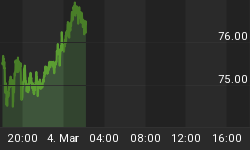It seems that economists and media have latched onto a new economic buzzword.
"Agflation" is the term being tossed about lately to describe the recent rise in food and grain prices worldwide. The term seems to recall the 1960s-coined phrase "stagflation, while alluding to the supposed inflationary effects of rising prices for staple food items.
But to say that rising food prices produce an inflationary (or, I suppose, an "agflationary") effect is to say that inflation is, itself, an occurrence of rising prices. While modern use of the term "inflation" has been corrupted to reflect this meaning, it is incorrect in light of its classical definition, an increase in the supply of money and credit.
When considering the term's original meaning, an increase in general prices reflecting a decrease in purchasing power is properly seen as an effect of inflation, not the cause of inflation, and not a precise description of the phenomenon itself.
This misuse of terminology is partly responsible for the confusion over rising prices. People are hearing and reading reports that say rising food prices are contributing to inflation. What they are really being told is that rising food prices may contribute to a rise in the level of consumer price goods, as measured by their government office or statistical bureau.
This, as we've seen by our definitions, is confusing the cause of inflation with its effects. Whether or not the ruse is intentional is an ongoing point of debate. What cannot be denied is the inference that a rising price level, or "inflation" (as the authorities would have it), is somehow attributable to rising prices of goods x, y, and z (whether they be food, energy, or automobiles).
If the public then swallows this line of reasoning, it can be shown that any unwanted rise in the consumer price index (or level of "inflation") is the result of rising prices in energy, food, or any measured good or service. Conversely, a "drop in inflation" can be engineered through the inclusion of goods that are falling in price (computers) or the removal of goods that are rising in price.
Unfortunately, in so-called developing countries, food prices tend to make up a higher proportion of personal expenditures and their consumer price indexes are weighted to reflect these levels. So while countries like the U.S. tend to downplay the importance of food prices in the consumer price index, price baskets in places like the Philippines seem to reflect the big hit that food prices have on the national wallet.
So what's really behind the worldwide rise in food and grain prices?
What we are seeing in rising food prices across the globe can probably be attributed back to two main causes: the dynamics of supply and demand and the ill effects of undisciplined money creation worldwide.
We've all heard the many recent reports of rising demand for meats and grains worldwide. We also know that much of our corn, sugar, and wheat is being consumed in the form of ethanol and other "renewable" fuels. An explosion of demand is occurring at a time when severe weather and droughts are hitting agricultural areas and further limiting supply. Still, the basic interplay of supply and demand seems to command less than primary importance in the explanations for rising food and grain prices.
Meanwhile, governments across the globe have been increasing their money supply at a fantastic rate. "Liquidity", in the form of paper/electronic money and credit, has been washing over the globe and sending prices of goods and assets up and down (and back again) in a manner that has rarely been seen.
Prices of financial assets are correlated in a way that they had never been before, and many individual commodities are rocketing higher, having felt the pull of increased consumption and investment/speculative demand.
Nations such as China and India are spending their foreign currency reserves on needed resources and have begun to invest surplus reserves into areas such as precious metals and other other hard assets. Securing control of limited foodstuffs in a time of growing demand is bound to be the next step.
Finally, inflation in some countries has brought about a policy of price controls, which inevitably leads to shortages of goods. Just as ever, politicians and their allies laud such policies, since they appear to put a lid on rising prices
The unfortunate reality, however, is that the system of wage and price controls is an artificial restraint on the marketplace, pushing trading and economic activity underground and into the black market. When prices are fixed and money loses its purchasing power, farmers and food manufacturers are likely to hold goods back from the market, rather than accept a price that does not allow them a profit. So in fact, these price control policies only exacerbate food and grain shortages.
Given this environment of high demand for commodities, together with the realities of limited resource supplies and the high rate of money and credit growth worldwide, it seems that the reasons behind rising prices for food and grains are no mystery. As long as money and paper financial obligations are created more easily than crops, the trend towards higher prices is likely to persist.















